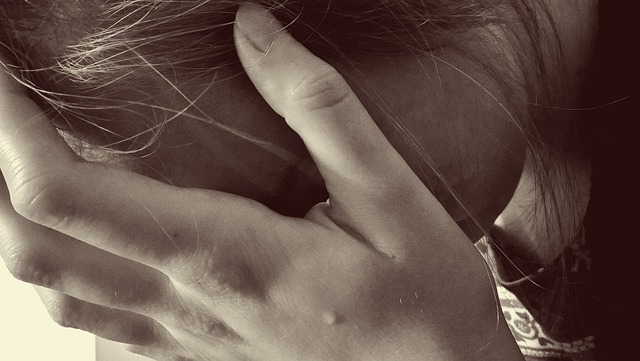"Do not cry in front of the little one." I heard that sentence as soon as I started crying, affected by something terrible that I couldn't control, while my soon-to-be four-year-old daughter was beside me.

For a moment, I stopped crying because the comment woke me up from the state I was in, but the emotions were stronger than me. Tears flowed down my eyes, while a whimpering sound came out of my mouth.
I was crying lying on the couch in the living room. My little one squeezed herself next to me, asking if I was okay, and I managed to say that I was hurt, that it had nothing to do with her, but that something else was bothering mommy. She gave me a kiss, and then did something so wonderful. She disappeared for a few minutes, and then came back carrying two things: band-aids and a blanket.
She covered me with her blanket, saying, "It will pass, mommy, here's a soft blanket to make it easier for you," and then she tried to open the band-aid because, as all parents know, a band-aid is a universal children's remedy for many things. I helped her open the band-aid and put it on my hand. "Now it will pass quickly," she said, gave me another kiss, stroked my head, and continued playing nearby.
I felt better in five minutes, and in fifteen, we were playing together.
Later, I googled whether it is okay to cry in front of a child, searching for information from psychologists' websites. I wasn't sure myself if the episode on the couch was okay or not. I came across many opinions, and they were all universally clear: Yes, it is okay to cry in front of a child. Furthermore, it is desirable.
Growing up, we may have sometimes received criticism to stop crying. Especially for boys, messages about crying were quite harsh. "Don't cry like a girl, you're a boy, why are you crying?" are still not uncommon among many parents today, who teach their children poorly not to show emotions, or rather, that showing emotions is something for women, for the weak.
As parents, we must know that our crying is also a normal occurrence. And by crying in front of our child, we show that we are normal and healthy human beings who experience emotions, that we are not superheroes or robots, but that we are similar to them - our children.
I'm not talking about crying every day and for everything, dramatizing and faking emotions to achieve something - that is bad in itself, so it is also bad to do it in front of a child. I'm talking about that crying when something really hits you hard, emotionally or physically.
Research has shown that expressing negative emotions through crying in front of children is not only acceptable but can also have a positive impact on their emotional development. Children who grow up in families where emotions are openly expressed will develop healthy emotion regulation skills and become mentally stronger individuals as they grow up.
Here's what psychologists say about why it's okay to cry in front of children:
We provide children with a healthy pattern of expressing emotions, showing them that it's okay to feel bad. If children see that expressing emotions is not a problem for their parents, they will develop the same behavior model. It can help children develop empathy and understanding. When we cry in front of children, we show them that we are also human and that we also struggle, just like they do sometimes. This can deepen the bond with children as it strengthens their sense of empathy and compassion for similar future situations where someone else around them might cry. We show that it's perfectly fine to be vulnerable and seek help.
Parents are role models for children, so if they see us asking for help from someone, they will likely do the same when they feel similar emotions in the future. Furthermore, it's important not to ignore the fact that children can sense negative emotions even when we don't cry. No matter how hard we try not to cry, children will sense that something is wrong. Therefore, it's better not to hide our emotions from them and confuse them, as our mind and body are not in sync, but rather show them that they have accurately sensed our emotions.
Psychologists note that it's not always okay to cry in front of children. Here's what to be cautious about:
Young children lack emotional maturity and the ability to understand complex emotions, so parental tears can overwhelm them to the point that they start crying too. Children can feel burdened if parents ask them to take care of them, which can ultimately result in anxiety, stress, and resentment. Strongly expressing negative emotions that involve aggressive actions can greatly frighten children. If you can't control yourself, it's better to find a place away from children. It's important to clearly verbalize to children, according to their age, what you are going through.
If your child asks why you're crying and expresses concern for you, you should explain what's happening so they won't be confused.
Mom is feeling a little sad right now. We all get sad sometimes, but it will pass. Mom will feel better soon.
Mom is crying because something has deeply affected her. You know when you're sad because your friend doesn't want to play with you, but everything turns out okay soon? Mom is a little sad right now, but she'll be fine in a few minutes.
Mom's arm is hurting a lot, she burned it on a pot. That's why mom is crying, don't worry, it will pass, but right now tears are coming because it hurts.